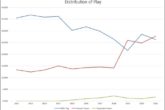First, some definitions. A Request for Bid results in the vendor is awarded the contract with the lowest price with a comparable commodity/service. A Request for Proposal provides the municipality flexibility in selecting a vendor based on criteria defined in the proposal. As Request for Information provides the municipality the greatest flexibility as is usually a wide ranging scope in which the vendor is provided leeway in responding.
A bid and a proposal is likely to result in the award of a contract. A Request for Information is likely to lead to a Request for Proposal.
Government, in attempting to promote transparency, equity, and ensuring that it most effectively utilizing taxpayer-funded revenue will frequently and inadvertently inhibit their likelihood of success from a myopic focus.
In a perfect world, a municipality would select any vendor without a request for a bid or a request for the proposal being issued for up to $50,000. This would simply the process for eliminating cumbersome procurement process for services of small scope.
Often in trying to comply with governmental mandates, municipalities recognize the flaws in the process and use “work-arounds” to get their vendor of choice. A few examples include: .
- They classify the product/service desired as “Sole Source” specifying the vendor desired.
- A proposal will be disqualified if they deem it non-responsive regardless of how trivial the deviation they cite. A respondent has little recourse to a disqualified proposal.
- A mandatory pre-bid meeting is required with the vendor being disqualified if they don’t have a representative at the pre-bid meeting. The meeting will be scheduled from late afternoon to early evening such that out-of-state vendors are required to spend two days traveling, incurring the cost for airfare, overnight hotel, and car rental. When a municipality requires a mandatory meeting, they are overtly trying to discourage/disqualify a broad response to the RFP. Virtual meetings are just as effective in many cases.
- Addendums to the RFP are issued less than seven days before the formal written proposal is due from a poorly run process. The appendix requires the vendor to initial to validate their response.
- Question for clarification of a bid is routed through the Purchasing Department who has little understanding of the technical questions being asked. The responses received by the vendor are often incomplete and provide little clarification sought.
- Multiple written copies, up to 10 copies in some cases, are required rather than allowing a single electronic document to be uploaded to the entity’s procurement department. The municipality makes the cost of responding expensive.
- Responses are required to be organized based on set guidelines based on methodology, qualifications, timetable, fees, etc. Thus, a vendor who has professionally prepared a response that comprehensively describes their service and the associated investment is required to reorganize their submission to comply with the structural requirements of the municipality.
- The form that a response may take is dictated by the municipality regarding bound vs. loose leaf presentations, restrictions on the number of pages, printing required on both sides of the paper, etc. The municipality makes the process of responding difficult.
- When bids are received, municipalities will often not keep the vendor informed of who responded, the evaluation process, or the timetable for a decision due to a poorly run process.
- A Committee is formed to evaluate the proposals and scored them based on a set of arbitrary criteria. Most are not qualified to vote. Many committee members only scan the proposals and assign points based on their own weighting scale. For example, if a vendor got a score of “0” on one item where 0 to 20 could be assigned, it would almost certainly make that respondent’s chance of prevailing nearly impossible based on the prejudicial vote of one person.
- A shortlist of qualified vendors is not created, and verbal presentations by responsive vendors are not scheduled. The contract award is based on the written proposal only.
- Vendors are denied the opportunity to review the “scoring” by the Committee stating it was “confidential,” thus rendering the opportunity to protest the aware difficult. The State’s Sunshine Laws and the Freedom of Information Act should be the governing rules for the release of this information.
- Vendors, if provided notice of the award – which is rare, are never given insight as to why their proposal was deemed non-response or not selected based on qualifications deemed lacking. A vendor rarely has a clear idea why they were not selected.
Here are some suggestions on how this process could be improved:
- A Request for Qualifications should first be issued to develop a list of qualified vendors.
- Input from vendors should be collectively sought to help the municipality precisely identify the scope of services they are seeking and the estimated cost for said services.
- If the Municipality has a preferred vendor, it should be so expressed to other vendors who query. Requiring vendors to prepare proposals when a favorite has been established is wasteful of both the municipality time and the vendor’s efforts.
- Mandatory on sight pre-bid meetings should be scheduled for non-consulting RFPS, i.e., contracts for architectural services or operational management. Non consulting RFPs should provide a virtual meeting option.
- Short-listed candidates should be interviewed. Upon the conclusion of those meetings, the scoring of the vendors finalized. Those respondents not selected should be informed timely, thanked for their participation, and provide insights on the defining criteria on which the preferred vendor was selected.
How else do you think the RFP process could be improved? Please call comment because the purpose of this blog is to assist municipalities to select the most qualified vendor and at an advantageous price that is respectful of a vendor’s services.

